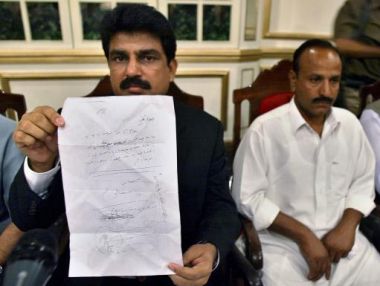Asia Bibi appeal hearing against blasphemy death sentence postponed

The appeal hearing against the death sentence of Asia Bibi has been postponed to a later date because of the absence of one of two judges who had been due to preside over proceedings today.
According to AsiaNews.it, a new date for the hearing has not been set. Pakistani law requires two judges to be present in death penalty cases for the duration of the trial.
Asia Bibi was accused of breaking the nation's blasphemy laws in 2009 by verbally abusing two Muslim co-workers, Islam and the Prophet Muhammad during an argument. She denied the claims, but was sentenced to death by the Pakistani courts in 2010.
The former Governor of Punjab, Salmaan Taseer, and Christian minister Shahbaz Bhatti were both murdered after expressing their support for Asia and calling for reform of the blasphemy laws, which are blamed by many for fuelling inter-religious tension and persecution across the country.
The blasphemy laws stipulate that "whoever by words, either spoken or written, or by visible representation or by any imputation, innuendo, or insinuation, directly or indirectly, defiles the sacred name of the Holy Prophet Muhammad (peace be upon him) shall be punished with death, or imprisonment for life, and shall also be liable to fine".
Minority faith groups are living in constant fear of punishment, as human rights groups say that the laws are frequently misused by extremists. False charges are often bought against Christians in order to settle personal scores or to seize property or businesses.
Nearly four years after receiving her sentence, Asia's appeal was due to be heard at the Lahore High Court.
Nasir Saeed, UK coordinator of the Centre for Legal Aid, Assistance and Settlement had asked Christians to pray for the hearing today and spoken of his desire to see that "only justice [be] in the forefront when reaching a decision".
As Asia's story is once again brought to light, the Global Minorities Alliance (GMA), which is committed to upholding and protecting the rights of persecuted minority communities, has released a report highlighting the systemic injustice prevalent in Pakistan.

Shahid Khan, Vice-Chairperson of GMA and author of 'Invisible Citizens of Pakistan: Minorities in Focus' says that successive Pakistani governments "have failed to protect and safeguard the fights of minorities".
"Instead they have feasted upon the weaknesses and vulnerabilities of the smaller minority groups by introducing laws which further pushed them deep into a sea of despair, injustice and inequality," he said.
The report details the discriminatory laws and law enforcement structure that allow for the abuse of minority communities, and have resulted in a significant amount of sectarian violence across Pakistan.
"Minorities are seen as non-entities and 'invisibles' in today's Pakistan with no equal, fundamental and constitutional rights. Where a governor, a judge or a minister is not safe, what hope does a vulnerable member of a minority community have?" he says.
The report has been sent to political and religious leaders all over the world, including Minister for External Affairs and International Relations in Scotland Humza Yousaf, who has responded by reiterating Scotland's commitment to "promoting a multi-faith, multi-cultural society".
"The Scottish Government is concerned by incidents of religious persecution in Pakistan, as highlighted in this report, and we continue to urge the Government of Pakistan to protect and guarantee the fundamental rights of all its citizens," he said.
GMA recommends in its report that the Pakistani Government extends full protection and freedom to all citizens, and immediately reforms its discriminatory laws.
"Without these changes, minority communities in Pakistan – which was founded as a free state where everyone has equal rights – will continue to face persecution in their homeland," it warns.











